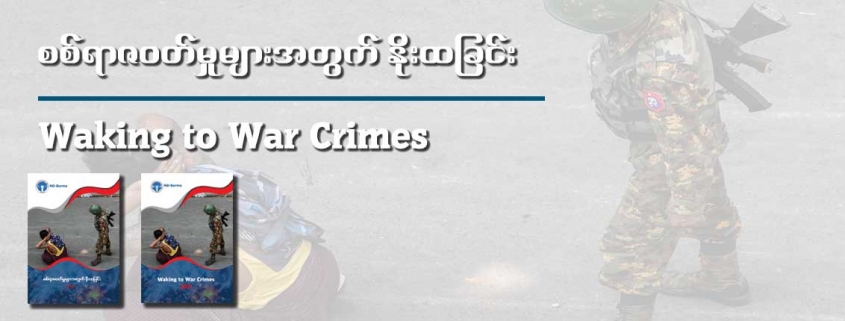Waking to War Crimes
The Myanmar military’s war on the people has devastated the lives of thousands across decades of unrelenting internal conflict. Since the junta’s attempted coup on 1 February 2021, their systematic assaults on civilian livelihoods has worsened across all regions and States in Myanmar. As divisive as they are deceptive, the Generals see themselves as the rightful governors of the State and have blatantly manipulated their own military drafted Constitution to justify their power-grab. Nationwide crackdowns have followed in response to peaceful protesters calling for a resumption of the democratically elected National League for Democracy (NLD) government.
The junta has scaled up military operations nationwide, targeting hundreds of innocent civilians. On September 7, the National Unity Government (NUG), a government formed by activists and elected officials, officially declared a ‘defensive war’ on the junta.1 The People’s Defense Forces (PDFs), which are groups of civilians trained in combat, are now fighting alongside various ethnic revolution organizations (EROs) against the military junta for their freedom. The onslaught of clashes has come with high casualty rates for both sides, including citizens who have been caught in the crossfire. By October, 3 million civilians were in desperate need of life-saving support with 219 000 people displaced by internal violence.
The junta has claimed that the NUG and PDFs are terrorist organizations in a failed bid to downgrade their legitimacy. These attempts have been unsuccessful as more evidence emerges which shows how the junta is violating human rights laws, norms and principles. The Special Envoy of the UN Secretary General on Myanmar, Christine Schraner Burgener, has called on the leader of Myanmar’s armed forces and orchestrator of the coup, Senior General Min Aung Hlaing, to step down. Echoing these sentiments has been the UN Special Rapporteur on the situation of human rights in Myanmar, Tom Andrews who has repeatedly called on the UN General Assembly to stand with and for the people of Myanmar.
From the very beginning of the Spring Revolution, it has been the individuals on the ground who have spoken truth to power despite the great risks faced in condemning the junta’s series of illegal and unjust acts. This has come at the cost of thousands of arrests as freedom fighters sacrifice their lives in the name of democracy for Myanmar. The voices of people of various ethnicities, genders, religion and socio-economic backgrounds persist and they continue to demand accountability from a regime who has sabotaged their survival.
At the time of writing, the junta has killed at least 1200 civilians since February with over 10 000 arrested amid a deeply hostile environment for peaceful protesters. With 60% of those killed by state forces around the world in 2021, Myanmar is currently the deadliest country in the world for demonstrators.6 Excessive lethal force by the military has seen at least 25% of those killed while protesting being shot in the head.7 Violence has not declined, rather it has worsened and exacerbated civilian anxieties over their well-being and security. The unyielding campaign of terror waged by the junta is gravely familiar to ethnic people who have suffered under their brutality for decades.
In Chin and Kayah (Karenni) States, everyday life has been especially challenging for civilians. The emergence of several local PDFs and armed resistance groups has led to the Myanmar junta regularly expanding their military operations. Sagaing region has also been hit particularly hard by the regime’s violence, which include the deployment of the ‘four-cuts’ tactics. The strategy has long been used to isolated rival groups by cutting off supplies to food, recruits, information and funding. Dozens have been killed as the regime loots villages, tortures civilians and engages in extrajudicial killings.



